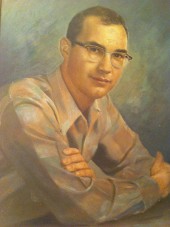 January 1, 2009.
January 1, 2009.
There is an article reprinted from England’s Telegraph in today’s Daily Queer News, “Why is ‘Sexual Identity’ Any of the Government’s Business?” about a retirement home having to ask about people’s sexuality — sort of a method of being sure — so the government told them when they made it a rule that they/we are not discriminated against. But the home is for older Christian workers.
This is just “grist for my mill,” Don Slater would say. It is the eternal dilemma of do we hide or do we just protect our privacy, and what are the consequences of speaking out proudly about our sexuality, hoping by all of us being out it will help change everyone’s mind about us?
It is probable that today there is some person or several persons who are doing good thinking on issues of homosexuality. I am sorry I don’t know about them. But I can say for sure that if so, they must be discussing this issue, and I have not met another person who has thought about this subject as much and as well as Don Slater.
Dorr Legg did a good (but largely ignored) job of teaching material on aspects already available, in subjects such as sociology, religion, law, etc.
And ONE magazine (I doubt ONE Quarterly was taken seriously although it was a start) published viewpoints better than any publication today, and I see no points today that were not covered in the magazine or Confi/newsletter/book reviews.
And the most basic one for Don was this issue of why do we want to “tell” everyone we are homosexual? And this article is the perfect example of why it could be wrong — why should the government, no matter what the excuse, know what type of sex we have (or prefer if we can have sex)?
As I understand him and others, probably including our next president, Tiger Woods has said that he will not check a box saying what race he is. He is several races. Why should he choose one over the other, and what difference would it make? The reason in the past was to prove that the government was including people of all races, but certainly now there is no reason to categorize us by race, religion, sexuality, and perhaps even sex/gender.
I think all other areas we work on are secondary to this basic issue. That is why Don Slater’s writing (since he refused to do a book — at least Dorr did the text book, Homophile Studies in Theory and Practice, which again is largely ignored, even by ONE Archives) in the magazine and newsletter is so important to get out, even to people like Warren but especially to young people seeking to understand themselves, a friend, or a relative.

